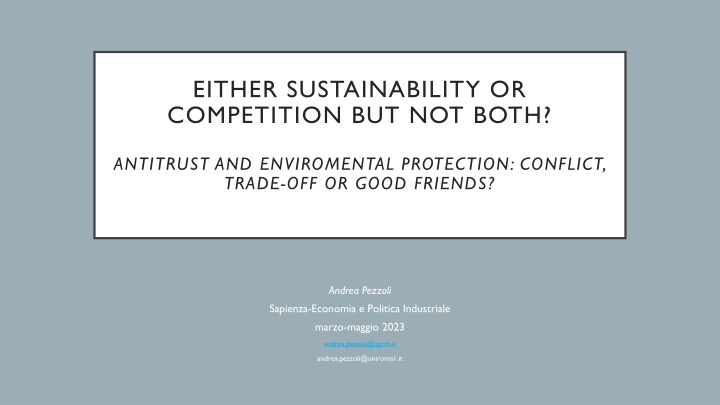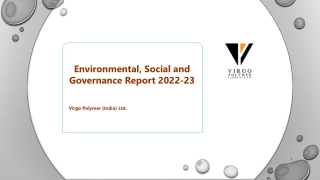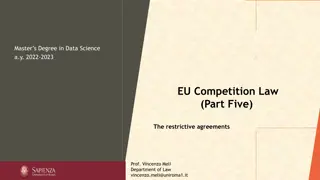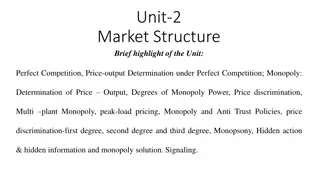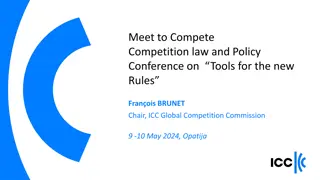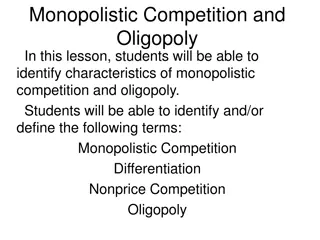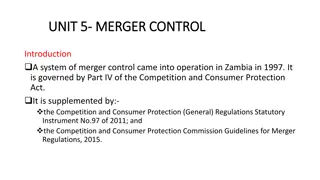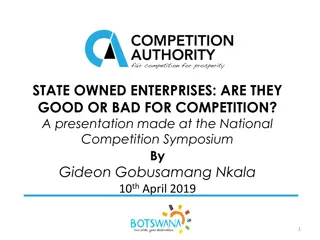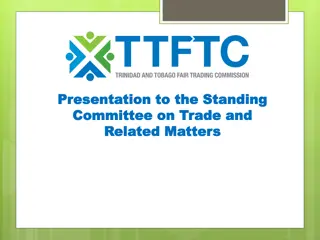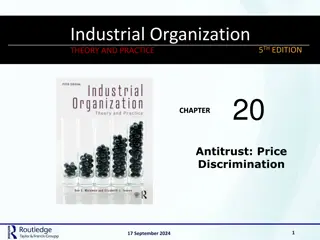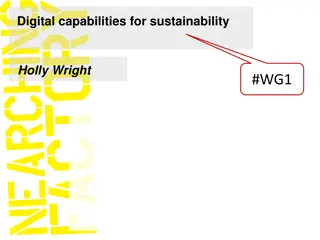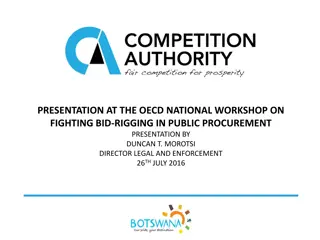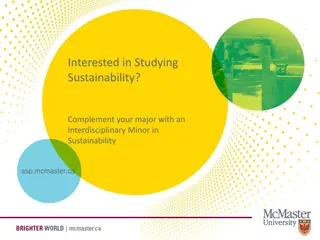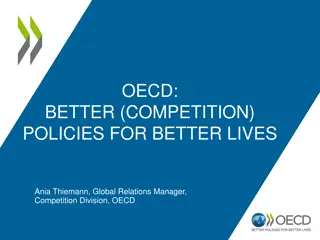Competition vs Sustainability: Seeking a Balance
Competition law and sustainability can either conflict or coexist harmoniously, depending on the circumstances. Integrating environmental protection into competition policy is vital for promoting sustainable development. Companies operating inefficiently face market survival challenges due to hidden environmental costs. Different perspectives exist on how competition law should address sustainability, with preventive and supportive approaches offering different solutions.
Download Presentation

Please find below an Image/Link to download the presentation.
The content on the website is provided AS IS for your information and personal use only. It may not be sold, licensed, or shared on other websites without obtaining consent from the author.If you encounter any issues during the download, it is possible that the publisher has removed the file from their server.
You are allowed to download the files provided on this website for personal or commercial use, subject to the condition that they are used lawfully. All files are the property of their respective owners.
The content on the website is provided AS IS for your information and personal use only. It may not be sold, licensed, or shared on other websites without obtaining consent from the author.
E N D
Presentation Transcript
EITHER SUSTAINABILITY OR COMPETITION BUT NOT BOTH? ANTITRUST AND ENVIROMENTAL PROTECTION: CONFLICT, TRADE-OFF OR GOOD FRIENDS? Andrea Pezzoli Sapienza-Economia e Politica Industriale marzo-maggio 2023 andrea.pezzoli@agcm.it andrea.pezzoli@uniroma1.it
OUTLINE Should Competition Law take account of Sustainability? When conflict does not exist: Sustainability and Competition go in the same direction When there is a trade-off : Sustainability and art. 101 (3) i. The Scope of Efficiencies ii. Benefit to Consumers (or Citizens) iii. Time-Horizon and Benefit for Next Generation
SHOULD COMPETITION LAW TAKE ACCOUNT OF SUSTAINABILITY? Sustainability has gone from being something we talk about, to a central goal of policies around the world. All of Europe s policies including competition policy have a role to play to get us there. (MargaretheVestager, Conference on Sustainability and Competition Policy, 24 October 2019) enviromental protection requirements must be integrated into the definition and implementation of the Union s policies and activities, in particular with a view to promoting sustainable development (Art. 11 TFEU, also found in Art. 39 of the EU charter)
MARKET AND ENVIROMENT Will companies which do not operate in a resource- and energy efficient manner survive on the market in the long term? For a large number of products enviromental costs are not reflected in the price, but are paid by the general public Prices are distorted and the market fails
COMPETITION AND SUSTAINABILITY: TWO DIFFERENT PERSPECTIVES (J. Nowag (2019), Competition Law s Sustainability Gap? Tools for an Examination and a Brief Overview, Lund University Legal Research Paper Series) Preventive Competition Approach: a measure that is harmul from a sustainability prevented/prohibited (sword) point of view is Supportive Competition Approach: competition rules are interpreted so that sustainability are allowed (shield) measures that support
COMPETITION AND SUSTAINABILITY: TWO DIFFERENT PERSPECTIVES (J. Nowag (2019), Competition Law s Sustainability Gap? Tools for an Examination and a Brief Overview, Lund University Legal Research Paper Series) Cases where no conflict exists (sustainability in line with competition provisions. Sustainability is achieved without the need to balance antitrust vs sustainability. It is achieved thanks to competition!) Cases where conflict exists (and thus balance takes place )
CASES WHERE NO CONFLICT EXISTS SUSTAINABILITY IN LINE WITH COMPETITION PROVISIONS (recent examples from the Italian experience) Agcm (2015), A476. Conai. Gestione Rifiuti da Imballaggi in Plastica, 03/09/2015, bullettin n. 33/2015 Committments. Agcm (2020), A531. Riciclo Imballaggi Primari/Condotte Abusive Corepla, 27/10/2020, bullettin n.45/2020 Sanction. Agcm (2021), I838 - Restrizioni nell'acquisto degli accumulatori al piombo esausti, 15/6/2021,bullettin n.27/2021 - Committments. .Agcm (2022),A545.Consorzio Polieco/CondotteAnticoncorrenziali, - Committments. Agcm (2021),A544.ErionWeee/CondotteAnticoncorrenziali Committments. Agcm (2021), A529. Google/Compatibilit App EnelX Italia con Sistema Android Auto, 27/04/2021,bullettin n.20/2021 Sanction.
COMPETITION AND SUSTAINABILITY: FEW QUESTIONS Is the measure detrimental to sustainability subject to competition prohibitions? Is the sustainability measure not subject to competition law prohibitions? Does the sustainability benefit outweigh the restriction of competition?
COMPETITION AND SUSTAINABILITY: THE DEBATE The main debates concern supportive integration of sustainability (shield): measures are designed in a way that either i) do not trigger competition or ii) the negative impact on competition is justified by its positive effects but don t forget that competition quite often fosters sustainability
OUT OF THE SCOPE OF COMPETITION LAW PROHIBITIONS If enviromental protection tasks are considered non- economic and of a social nature (definition of undertaking) If the conduct is imposed by the State (State Action Defence and CIF) Agreements that are unlikely to restrict competition: the agreement is creating a new market that would not otherwise exist; standardisation sustainability, par. 280 Guidelines for the applicability of art. 101 ) agreements concerning
ONLY WHEN IT IS CLEAR THAT THE MEASURE RESTRICTS COMPETITION, IT IS NECESSARY TO MAKE A COMPETITIVE BALANCE THE SCOPE OF EFFICIENCIES 1. The scope of efficiencies:EU 101(3) Guidelines differentiate between cost and qualitative efficiencies Sustainability agreements are likely to increase cost so qualitative efficiency is crucial If consumers place a value on those qualitative efficiencies (e.g. biodegradability or rainforest friendly and willingness to pay) How can we measure the value that consumers place on those qualitative factors? What if the qualitative efficiencies are quite remote (i.e. collective enviromental benefits or benefits in the long term)? What if qualitative efficiencies are so remote that is hard to measure them or if consumers in the affected market do not put any value on them? 2. 3. 4. 5. 6.
ONLY WHEN IT IS CLEAR THAT THE MEASURE RESTRICTS COMPETITION, IT IS NECESSARY TO MAKE A COMPETITIVE BALANCE TO WHICH CONSUMERS MUST THE BENEFITS ACCRUE? 1. Is sustainability as such and without benefits for individual consumers (of the product in question) enough to satisfy art.101 (3)? How broad may be the interpretation of benefits for the consumers ? Consumers of related markets (consumers affected are substantially the same)? Can consumers be read as citizens ( enviromental results for society would adequately allow consumers a fair share of the benefits ,CECED)? Para 85 of the 101 (3) Guidelines states that the net effect of the agreement must at least be neutral from the point of view of the consumers directly or likely affected by the agreement. 2. 3. These questions are relevant only if the benefits cannot be understood as qualitative improvements that benefit the consumers of the product in question (which most of the sustainability benefits can )
ONLY WHEN IT IS CLEAR THAT THE MEASURE RESTRICTS COMPETITION, IT IS NECESSARY TO MAKE A COMPETITIVE BALANCE THE APPROPRIATE TIME HORIZON Enviromental benefits are likely to arise for the next generation Privileging a static approach potentially large future enviromental benefits might be blocked CAs have the tools to address remoteness by applying a lower weighting for more remote benefits but at least some of the benefits should be enjoyed by the consumers in the market agreements with
THE APPLICATION OF A MORE SUSTAINABLE APPROACH FOR MERGER REVIEW Efficiencies Too much reliance on purely economic parameters? Par.76 of the Horizontal Merger Guidelines thereby improving the conditions of growth and raising the standard of living in the Community Benefit to Consumers: indirectly? Efficiency benefit should be realized in time (par.79 HMG) Verifiability
THE APPLICATION OF A MORE SUSTAINABLE APPROACH FOR MERGER REVIEW Remedies Primary purpose of remedies is to remove competitive concerns How enviromental remedies can help to remove such concerns It is questionable whether CAs are exceeding their competence by actively including sustainable measure At most add-on in a package of commitments (?!)
PREVENTIVE INTEGRATION (SWORD) Much less frequent but it happens quite often - at least in specific industries, like waste managment - that if an undertaking violates competition rules at the same time negatively affects sustainability Some interesting examples experience of the ICA RIEMPIRE Cases based on innovation harms may provide a viable route by which sustainability can be indirectly achieved (handle with care Cas cannot set enviromental standards, dangers regarding competence might emerge!) may be provided from the
PURITY AND LEGITIMACY The purity of competition law cannot justify the exclusion of enviromental or sustainability concerns (art. 11TFEU) Legitimacy: do CAs possess sufficient legitimacy to make complex value judgments? According to some authors the constitutional framework (art. 11 TFEU) requires them to do so If the agreement is restrictive and it is not benificial for today consumers in the market but only for the next generations,isn t it better to allow it through public policy?
SOME REFERENCES ACM/HCC https//www.acm.nl/sites/default/files/documents/technical-reportsistainability-and-competition 0.pdf. (2021), Technical report on Sustainability and Competition, available at the following link: EU Commission (2022),draft revised Horizontal Block Exemption Regulations and Horizontal Guidelines. Holmes,S.(2020),ConsumerWelfare,Sustainability and Competition Law Goals,in Concurrences,2; Metz, D. and Fischl ,A. (2019), Towards a More Sustainable Approach in European Competition Law? A Discussion Based on the Example of Merger Control in the Aviation Industry,forthcoming Murray, http://competitionlawblog.kluwercompetitionlaw.com G. (2019), Antitrust and Sustainability: Globally Warming up to be a Hot Ttopic?, Nowag,J.(2019),Competition Law s Sustainability Gap? Tools for an Examination and a Brief Overview,forthcoming with We are Competition Nowag,J.andToerell.A.(2020),Beyond Balancing:Sustainability and Competition Law,in Concurrences,4. Pezzoli,A.(2022),Come era verde il tuo cartello, Analisi Giuridica dell economia,Vol.1. Van Der Zee, E.(2020),Quantifying Benefit on SustainabilityAgreement UnderArt.101TFUE,inWorld Competition,43,2.
